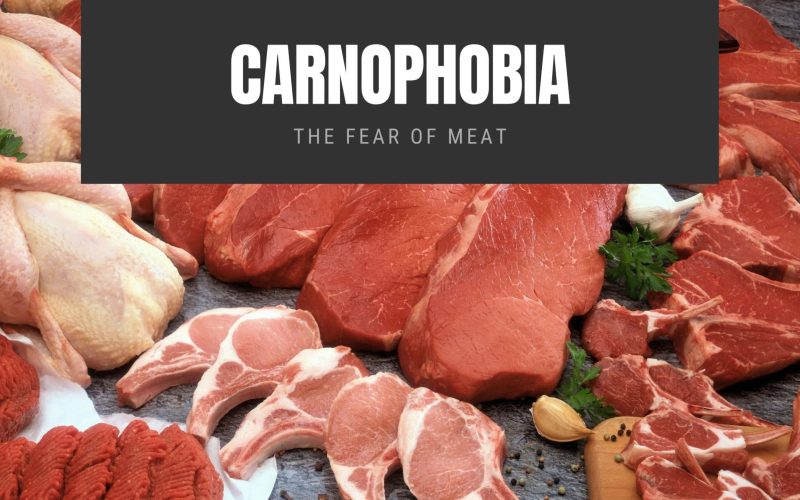The term “Carnophobia” originated from the combination of the Latin word “Carno” which means “meat” and the Greek word “phobia” which means “fear or aversion.”
Carnophobia is defined as irrational and excess fear or intense aversion to meat. Carnophobia is considered to be a specific phobia and sufferers of this phobia are called carnophobics.
The thought of carnophobia in some individuals may cause them to develop panic attacks. When such persons are triggered, they experience a series of symptoms depending on the severity of the condition.
These symptoms may cause the individual to avoid meat at all costs, and this affects them severely. Fortunately, the condition is treatable.
Causes of Carnophobia
Similar to other phobias, carnophobia does not have an exact cause, but experts believe that the factors that contribute to the development of this condition may include:
Traumatic experiences
These may involve unpleasant events that may have happened in the past, which can cause trauma in a person.
These unpleasant events can include:
- A traumatic experience at a butcher shop or slaughterhouse
- An accident that occurred while preparing meat. This could be a cut or a burn.
- A serious health complication after the consumption of meat.
- An emotional reaction to images, campaign or advertisements for or against meat and its products
Genetics
Experts believe that fearful genes are inheritable the same way traits are. Parents with phobias are likely to pass them down to their children or even their children’s children.
Upbringing
When you are being raised by a caregiver who has phobias, especially carnophobia, a person is likely to have this fear as well.
Environment
Our environment has always had a substantial influence on our lives. Therefore, where we are raised has a considerable effect on us.
If a person is raised in an environment where there are many people living with sufferers, including carnophobia, then they may develop the condition as well.
Also, when you grow up in a place where people close to you have negative experiences and beliefs about meat, then you may have this phobia later on.
Presence of other illness
Certain health conditions and aging can make you refrain from eating meat. Your doctor may also recommend other options asides the consumption of meat.
Besides, certain patients believe that their ailments are caused by eating meat. This can make them or the people close to them have this phobia.
Personal beliefs
Personal beliefs affect our personality. When a person believes in the following, then they are likely to develop carnophobia:
- That killing animals for meat is cruel
- That eating or killing is a sin according to their religious beliefs
- That eating meat is the core cause of many diseases
- That animals have rights and should be treated with respect
- They are active vegans
People living with carnophobia would not want to eat any meat-like products such as chicken, steak, sausage, hot dogs, ham, and turkey.
Symptoms of Carnophobia
These are symptoms that manifest when someone has a phobia sufferers experience them when they are triggered due to exposure to their object of fear. These symptoms are similar across various phobias.
Nevertheless, the severity of these symptoms varies across persons. Persons with carnophobia may experience the following symptoms when they see, hear or think about meat.
Physical Symptoms
- Excess sweating
- Trembling
- Hot flushes
- Shortness of breath
- Choking sensation
- Increased heart rate
- Sharp chest pain
- A feeling of butterflies in the stomach
- Nauseous feeling
- Headaches
- Dizziness
- Feeling faint
- Numbness
- Dry mouth
- Frequent need to go to the toilet
- Ringing or buzzing sounds in the ears
- Confusion or disorientation
- Hyperventilation
- Increased blood pressure
Psychological Symptoms
- Fear of losing control
- Fear of fainting
- Feelings of dread
- Fear of dying
- Fear of harm or illness
- Feeling of guilt, shame, and self-blame
- Withdrawing from others
- Feeling sad or hopeless
- Feeling disconnected
- Confusion, difficulty concentrating
- Anger, irritability, mood swings
- Anxiety and fear
You may be suffering from carnophobia if the thought of exposure to meat causes at least three of the above-mentioned symptoms. Notwithstanding, some people suffer from complex phobias.
A complex phobia is when somebody has two or more phobias. Such persons, when triggered, may experience a chain of these symptoms.
Treatment of Carnophobia
People with carnophobia naturally try to protect themselves by avoiding meat. They may feel they don’t need treatment, and they can always avoid getting triggered by avoiding meat.
Although, severe cases of carnophobia may affect the sufferer’s ability to handle assigned tasks as well as carrying on with their normal daily activities.
Phobias generally can limit a person’s life, including the patient’s relationship with their environment, loved ones and other people.
Therefore, the patient needs to be treated as soon as possible. Unfortunately, no treatments available are known to cure the phobia.
However, the following treatments may be applied to help the patients overcome their fears.
Self-care
Self-care is necessary to help keep yourself happy and healthy. This is an approach you take by yourself first and its deemed effective in dealing with mild cases of phobias.
Self-care techniques may include the following:
- Reading up reliable information about meat and concentrating on the positive aspect of meat instead of the negative aspects
- You can keep your mind occupied with healthy activities such as reading good books, exercising, listening to music, watching tutorials, and more
- Practice mindful meditation to help you attain inner peace and also focus your mind to more positive thinking patterns
- You can discuss with your healthcare provider on how to maintain a healthy diet. This helps to improve your cognition as well as take your mind away from your source of fear.
- Stress can worsen many medical conditions; therefore, it is necessary that you take your time to rest and relax. This will help keep you calm and controlled at times.
These are just a number of the self-care routines to adopt to help make you more aware of yourself and also control your fears and anxieties before they get worse.
Therapy
Consulting a therapist will help you overcome your fears. This is because therapists are trained personnel who are equipped with the necessary skills to help you overcome your fears.
Your therapist may use the following techniques:
Cognitive-Behavioural Therapy (CBT)
This is the most common approach in treating phobias and other mental health problems. While adopting CBT, your therapist will help you to identify all those unhealthy thinking patterns that make you fear meat and then help you to change them into positive ones.
Exposure Therapy
Exposure therapy is a technique where your therapist gradually exposes you to your object of fear within a controlled environment.
By doing this, you are likely to feel less threatened at each exposure until you feel no fear even when you come in contact with your fear.
This should be done by professionals only as the wrong application may worsen the condition.
Hypnotherapy
Hypnotherapy is the reconstruction of the subconscious mind. In your subconscious mind, they may be certain beliefs, memories, and thoughts locked in there, and this may be responsible for your fear.
Hypnotherapy involves your therapist applying the necessary skills to unlock your subconscious mind and alter those negative thoughts, memories, and beliefs into positive ones.
Use of drugs
Certainly, medicines are not the cure for phobias, but they are taken to help suppress anxiety and other symptoms of phobias.
These drugs include:
- Anti-anxiety medications: This is used to reduce anxiety. Valium is a good example of anti-anxiety.
- Anti-depressant medicines: This is prescribed because it lowers anxiety. Lexapro is a common anti-depressant.
You are likely to take these medicines and have a handful of side effects, and long-term use may cause addiction and dependence.
Therefore, you should never use these medications outside your doctor’s prescription.
Support groups
Support groups are available both online and offline, and they can help you overcome your phobia. By joining a support group, you get the opportunity to connect with individuals who are living or must have lived with your type of phobia.
Support groups give you the homely feeling that you are not alone, and they help provide support to help you overcome your fears.








